Perfect square trinomials
Square root of a and the square root of c
all multiplied by 2 is equal to b
4x² + 12x + 9
Square root of 4 -> 2
square root of 9 is -> 3
2(2)(3)
= 12 = b
∴ This is a perfect square trinomial
(2x+3)²
(3x+4)(8x+5)
24x² + 15x + 32x + 20
24x² + 47x + 20
Floating topic
used to simplify
equations/expressions
done so by finding the greatest common
factor in an expression/equation
Math - Chapter 5
Expanding
squaring binomials
(a+b)²
can be solved in 2 ways
(a+b)(a+b)
Subtopic
FOIL it
a²+ab+ab+b²
using Formula
a² - 2ab+b²
(a-b)²
a²+2ab+b²
Short form
distributive property
multiply a single term
by 2 or more terms
used to expand
equations/expressions
Multiply binomials
methods to do this
FOIL
F - First
O - Outer
I - Inner
L - Last
its like applying the
distributive property twice
multiply each term in the first
factor by each in the second
2 factors of 2 terms being
multiplied to each other
(x-4)(x-5)
difference of squares
part of factoring as well
(4x+5y)(4x-5y)
simplifies to
(4x)² - (5y)²
16x² - 25y²
(a+b)(a-b)
all term a = to the same thing
all term b = to the same thing
a² - b²
Factoring
Factoring Quadratic expressions (a=1)
find 2 integers that when
multiplied is equal to c
those 2 integers have to also
equal to b when added together
ax² + 5x +6
__ x __ = 6 (c)
__ + __ = 5 (b)
Those two integers are 2 and 3
2 x 3 = 6 (c)
2 + 3 = 5 (b)
r = 2
s = 3
(x+2)(x+3)
can be switched around
r ans s can equal to
which ever integer
always see if you can common
factor something out first
in this case no
where a, b, and c are integers
in this case a is equal to one
Factoring Quadratic expressions (a≠1)
ax² + bx + c
Where a, b, c are integers
Find 2 integers that when multiplied together is equal to a X c
Those same two integers have
to add up to b
a(x+r)(x+s)
3x² + 8x +4
__ x __ = 12 ( a X c)
__ + __ = 8 (b)
Those two integers are
2 and 6
2 x 6 = 12 (a X c)
2 + 6 = 8 (b)
Break down b into 2x and 6x
and add that to the equation
3x² + 2x + 6x +4
Group factor
x(3x+2) + 2(3x+2)
(3x+2)(x+2)
refer to group factoring
Group common factors
4 terms separated into 2 groups
find common factor for both groups
produces a binomial common factor
2wx + 10w +7x + 35
l_________l l______l
group one Group two
Group 2 ->
7 is the greatest common factor
7(x+5)
Group one ->
2 and w = greatest common factor
2w(x+5)
2w(x+5) + 7(x+5)
binomial common factor
refer to binomial common factor
(x+5)(2w+7)
Binomial common factors
A binomial factor that is shared by all the terms of a polynomial
common binomial among a polynomial
7(x-3) - 2x (x-3)
(x-3) is the greatest common factor
(x-3) [ 7(x-3) 2x (x-3)]
______ - ______
(x-3) (x-3)
(x-3)(7 - 2x)
When (x-3) is removed from the terms
(7-2x)
divide everything by (x-3)
put it outside the bracket
∴ equation not changed
Binomial = 2 terms
Monomial common factors
factor out a monomial out of a set of terms
6x² - 14x + 8
the biggest number that can
divide all of these terms is 2
no biggest common variable
2 is the only thing common
among all 3 terms
divide everything by 2
6x² - 14x + 8
___________
2
2(3x² - 7x + 4)
you cannot change the equation
that's why the 2 is put in the
front of the brackets
if you ere to expand it you would
end up with the same equation as before
nothing was changed
only simplified
Monomial = 1 term









